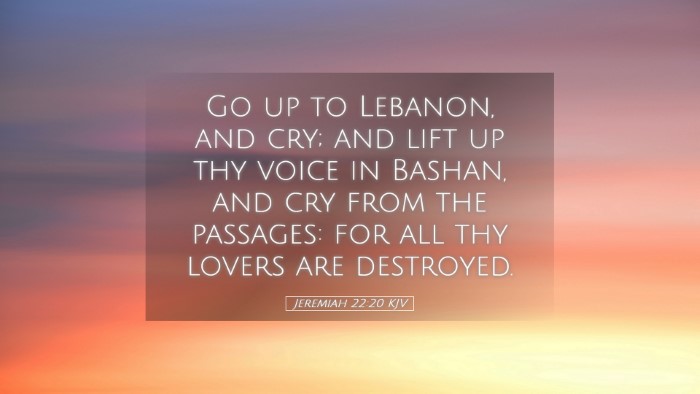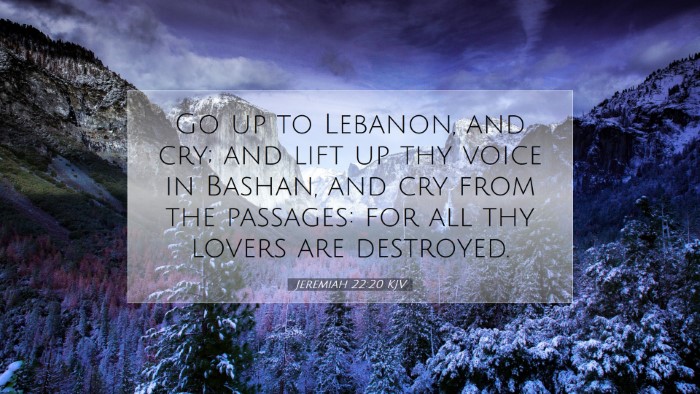Commentary on Jeremiah 22:20
Jeremiah 22:20 states:
"Go up to Lebanon, and cry; and lift up thy voice in Bashan, and cry from the passages: for all thy lovers are destroyed."
Contextual Background
This verse is nestled within a passage that emphasizes the fall of Jerusalem and the impending judgment on its leaders. Jeremiah is called to deliver a message of lamentation, highlighting the futility of alliances that have crumbled.
Insights from Public Domain Commentaries
Matthew Henry's Commentary
Matthew Henry notes that this verse signifies a pronouncement of impending doom directed at the leaders of Judah. He emphasizes that Jeremiah is metaphorically sent to the mountains of Lebanon and the plains of Bashan, regions known for their beauty and strength. Here, the prophet is instructed to mourn for Judah's unfaithfulness.
- The Call to Cry: Henry remarks that the command for Jeremiah to cry indicates a deep and urgent warning. It underscores the seriousness of Judah's spiritual condition.
- Destruction of Lovers: The phrase "for all thy lovers are destroyed" suggests that the alliances and power structures that Judah relied upon have failed, signifying a broken trust in worldly powers.
Albert Barnes' Notes on the Bible
Albert Barnes elaborates on the geographic imagery used in this verse. Lebanon and Bashan were symbols of strength and stability, pointing to places where help was anticipated. The prophetic call to cry out in these regions indicates the deep sorrow over the loss of what once appeared formidable.
- Symbolism of the Locations: He explains that Lebanon represents lofty ideals and power, and its felling symbolizes the loss of those higher aspirations.
- Crying as a Symbol of Mourning: Barnes emphasizes that the call to weep and cry reflects God’s desire for repentance from His people, highlighting sorrow over disobedience.
Adam Clarke's Commentary
Adam Clarke takes a more theological angle, exploring the broader consequences of Israel's infidelity to God. He posits that the lamenting voice of Jeremiah serves as a plea for awakening among the people of Judah.
- Spiritual Implications: Clarke interprets this crying out as not solely a physical act but a spiritual cry for the restoration of Israel’s covenant relationship with God.
- Impending Judgment: He correlates the destruction of alliances to God’s judgment against His people for their sins, reinforcing the certainty of divine retribution.
Theological Themes
This verse encapsulates key theological themes relevant for understanding the nature of God’s justice and mercy. The explicit call to weep illustrates the emotional engagement God has with His people and the nature of their rebellion.
- Divine Grief Over Human Indifference: God's call to mourn showcases His sorrow over the state of affairs in Judah, reflecting a relational aspect of divine judgment.
- The Folly of Reliance on Worldly Alliances: The destruction of "lovers" serves as a warning against placing trust in human institutions rather than in God.
Applications for today
The implications of Jeremiah 22:20 resonate profoundly within contemporary ministry and theological study:
- Call to Repentance: Just as Jeremiah's message was one of mourning, today’s church is called to recognize and address the spiritual state of society, inviting repentance and restoration.
- Faithfulness in Alliances: In a time when organizations and alliances may falter, believers are reminded to place their ultimate trust in God rather than in temporary alliances.
- Emotional Theology: Understanding God’s call to lament reminds the church of the need for emotional authenticity and engagement in prayer and worship.
Conclusion
Jeremiah 22:20 serves as a profound reminder of the consequences of unfaithfulness and the depth of God’s desire for His people to return to Him. The prophet’s lament is an enduring message calling the church to discernment, repentance, and reliance on divine strength rather than human semblance of control.


